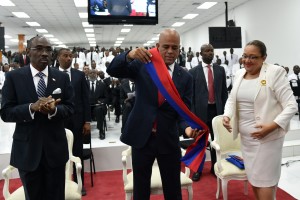
by Amelie Baron
Port-au-Prince, Haiti(AFP) — Michel Martelly ended his presidential term Sunday without handing power to a successor, in an electoral crisis highlighting Haiti’s long struggle to keep democracy on track in the 30 years since the Duvalier dictatorship ended.
Martelly was able to leave office thanks to a last-minute agreement hours before to install a transitional government after prolonged protests that sometimes turned violent.
“During its long road to the promised land, Haiti will remember that a certain Michel Joseph Martelly, Micky for his people, loved, gave, built,” he said during his last address as president.
Speaking before lawmakers at parliament in French and Creole, the outgoing president thanked those who accompanied him during the five years of his mandate. He also defended his family against accusations of embezzlement.
But he also acknowledged that history “will recall my failures, for which I take sole responsibility, among them the delay of presidential elections.”
The electoral process was stopped after challenges from the opposition, which condemned an “electoral coup d’etat” masterminded by the executive power.
In the first round of presidential voting in October, Moise officially won 32.76 percent of the vote, to 25.29 percent for Celestin, who denounced those results as a “ridiculous farce.”
A second round of presidential and partial legislative elections, initially set for December 27, was postponed indefinitely, preventing Martelly from handing power to an elected successor on February 7 as required under the constitution.
The vote, a runoff between Martelly’s favored candidate Jovenel Moise and opposition flag-bearer Jude Celestin, was called off following violence and opposition protests by demonstrators alleging that foul play had helped the government candidate take the first round.
– What comes next? –
After Martelly handed him the presidential sash, national assembly president Jocelerme Privert sought to reassure a population on edge.
The former pop music star’s departure “does not halt the course of history, our history.”
Lawmakers now have five days to elect an interim president whose mandate cannot exceed 120 days.
Privert himself is among the “serious candidates,” according to several lawmakers, along with high-ranking Judge Jules Cantave.
The agreement sets a new election for April 24, with a new president installed May 14, though Privert has stressed those were only proposed dates.
“Personally, I think this time frame is short: 120 days to accomplish all that will be difficult, but I hope that the sense of urgency will benefit us,” said lawmaker Jerry Tardieu.
The United States and United Nations welcomed the deal, which the world body’s chief Ban Ki-moon urged parties to implement.
Ban “encourages all actors to promote measures aimed at fostering calm and stability (and) reaffirms the commitment of the United Nations to extend its full support to the Haitian people in the fulfillment of their democratic aspirations,” his spokesman said.
US State Department spokesman John Kirby, for his part, said Washington “welcomes the agreement… to ensure the continuity of governance and the completion of the ongoing electoral process.”
“Echoing the Core Group statement of February 6, we trust ‘that all actors will keep the best interests of Haiti and its people above all other considerations,'” he added.
A potential long-term power vacuum is the latest challenge for a country that is already the poorest in the Americas.
In reducing potential foreign investment, the political instability is also further increasing inflation, which hurts most the 60 percent of Haitians living under the poverty line
amb-oh/mdl
© 1994-2016 Agence France-Presse







